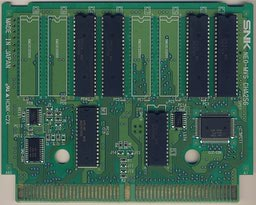CHA256: Difference between revisions
Jump to navigation
Jump to search
(speculation on how the C-rom jumpers work) |
(fixed formatting) |
||
| Line 69: | Line 69: | ||
|J14 | |J14 | ||
|} | |} | ||
A [[NEO-273]] and a LS74 are used to address C ROM. The LS74 provides the 2 most significant bits. The LS139 enables one of four pairs of C ROMs using 2 address inputs depending on which 2 jumpers are connected. | |||
*Max 256Mbit C ROM (8x 32Mbit) | |||
{| class="wikitable" | {| class="wikitable" | ||
| Line 82: | Line 86: | ||
|} | |} | ||
*[[NEO-273]] | *[[NEO-273]] | ||
*[[NEO-ZMC]] | *[[NEO-ZMC]] | ||
| Line 90: | Line 91: | ||
==AES version== | ==AES version== | ||
{| class="wikitable" | |||
|- | |||
!C ROM type | |||
!Jumper set | |||
|- | |||
|<4MiB | |||
|J15+J16+J17+J18 | |||
|- | |||
|4MiB | |||
|J11+J12+J13+J14 | |||
|} | |||
{| class="wikitable" | {| class="wikitable" | ||
Revision as of 20:28, 13 April 2021

C ROMs
Up to 8 * 32Mbit ROMs (27C322) can be used for a maximum of 256Mbit. 27C800/27C160 can also be used depending on jumper configuration.
The size of largest ROM is selected using a pair of jumpers. The rest should be left unconnected.
| Largest C ROM | Jumper set |
|---|---|
| 1MiB | J5+J6 |
| 2MiB | J7+J8 |
| 4MiB | J9+J10 |
| C1/2 ROM type | Jumper set |
|---|---|
| <4MiB | J15 |
| 4MiB | J11 |
| C3/4 ROM type | Jumper set |
|---|---|
| <4MiB | J16 |
| 4MiB | J12 |
| C5/6 ROM type | Jumper set |
|---|---|
| <4MiB | J17 |
| 4MiB | J13 |
| C7/8 ROM type | Jumper set |
|---|---|
| <4MiB | J18 |
| 4MiB | J14 |
A NEO-273 and a LS74 are used to address C ROM. The LS74 provides the 2 most significant bits. The LS139 enables one of four pairs of C ROMs using 2 address inputs depending on which 2 jumpers are connected.
- Max 256Mbit C ROM (8x 32Mbit)
| M1 ROM size | Jumper set |
|---|---|
| 64KiB | J1+J4 |
| 128KiB | J2+J3 |
AES version
| C ROM type | Jumper set |
|---|---|
| <4MiB | J15+J16+J17+J18 |
| 4MiB | J11+J12+J13+J14 |
| EVEN delay | Jumper set |
|---|---|
| 1 gate | J19 |
| 2 gates | J20 |